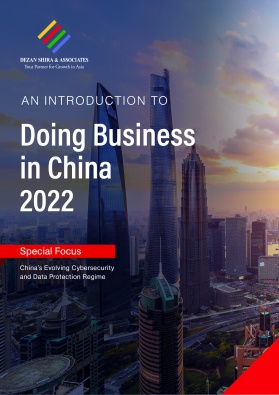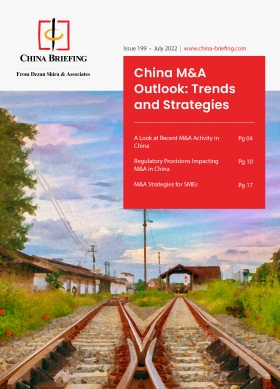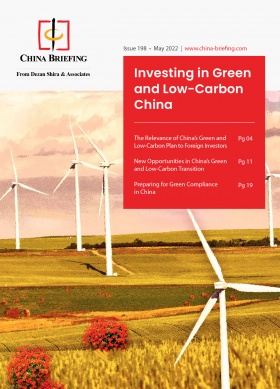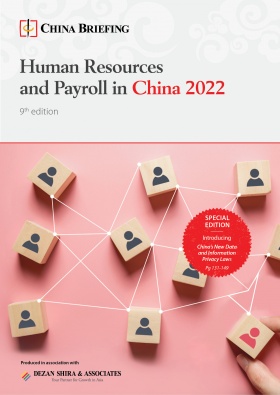Shanghai Releases 22 New Stimulus Measures to Boost the Economy
The Shanghai Municipal Government has released a new policy package containing 22 stimulus measures to assist companies still suffering from the effects of the COVID-19 pandemic and to boost the city’s economic recovery. We explore how these measures can help companies in Shanghai in their post-pandemic recovery and stimulate growth.
On September 26, 2022, the Shanghai Municipal Government released a set of 22 measures in a document introduced as Several Policies and Measures of Shanghai on Supporting Industries, Bolstering Market Entities and Stabilizing Growth (“new measures”), including a broad variety of strategies to jump-start economic recovery and expansion of the services sector, such as tourism and aviation, in a full-fledged effort to accelerate the city’s economic growth for the remainder of 2022. The measures were announced and publicly discussed during a press conference held on September 28, 2022, in the presence of Wu Qing, Member of the Standing Committee of the Shanghai Municipal Party Committee and Executive Vice Mayor.
Since the beginning of 2022, the Shanghai Municipal Government has successively introduced two rounds of policies to help enterprises and stabilize growth, namely the 21 policies ‘to fight the pandemic and help enterprises promote development’, released in March, and the 50 measures for ‘economic recovery and revitalization’, announced at the end of May.
Drawing upon the previous two rounds of policy measures, the latest batch follows the State Council’s 19-point growth plan released in August of the same year.
The slew of stimulus measures is an attempt to hasten the city’s economic recovery. According to the local customs agency, Shanghai’s overall foreign trade volume in the first eight months of 2022 was RMB 2.7 trillion (US$390 billion), up 4.8 percent year on year, reversing a minor annual dip in the first half of the year due to the impact of the COVID-19 lockdown.
In this article, we walk you through the key points of the new measures and discuss the most relevant for businesses.
Relief and support measures for businesses
The policy package includes mechanisms and proposals for assisting micro, small, and medium-sized enterprises (MSMEs) in their economic recovery and growth. Small enterprises are regarded as the basis of the Chinese economy, accounting for the great majority of total firms, and producing over half of the national GDP. They are also among the most vulnerable institutions in the countries, and as such, the government has prioritized their protection and survival.
In China, MSMEs respond to specific legal designations illustrated in regulatory documents, such as the Small and Medium-Sized Enterprises Classification Standard.
Loans and risk compensation funds for MSMEs
The new measures seek the implementation of the national requirements for establishing loan risk compensation funds for both MSMEs and self-employed businesses. They also call for the promotion of a long-term mechanism for credit awards and subsidies. This is because measures, such as the loan risk compensation scheme and subsidies, are used to stimulate the spending of MSMEs to generate overall growth.
According to the new policies, in the fourth quarter of 2022, MSMEs will be given a two percent discount interest subsidy, with a maximum amount of discount interest for a single enterprise amounting to RMB 200,000 (US$28,105).
Deferment of medical insurance
Starting from the fourth quarter of 2022, the ratio of employees’ medical insurance (including maternity insurance) contributed by the employer will be reduced by 0.5 percent. Moreover, in accordance with the latest national policy requirements, the medical insurance payment for September, October, and November can be deferred.
In addition, the collection of drug registration fees and medical device product registration fees will be deferred for one quarter.
Expanding the scope of fees reduction and exemption policies
Striving to ensure employment, safety, and livelihood is another major objective of the new policy plan. To achieve so, the measures call for the implementation of the requirements of the national one-time post-expansion subsidy policy, and further expand the subsidy scope to key groups such as unemployed college graduates and registered unemployed youth. Social security subsidies will be given to those who have difficulties in flexible employment, and college graduates who have been unemployed for over two years.
In the fourth quarter of 2022, the toll for toll road trucks will be reduced by 10 percent, and the standard of port charges for government-priced goods will be reduced by 20 percent.
The government will implement preferential tax policies to support the manufacturing industry and extend the deferment of several taxes such as the income tax for another four months after the expiration of the deferred period from September 1, 2022.
Measures for attracting foreign investment and trade
A variety of policy initiatives are proposed in the policy package to support significant foreign investment projects and attract additional foreign investment.
Measures to support foreign trade
In terms of trade and commerce, banking institutions and guarantee institutions are encouraged to:
- Reduce or exempt the relevant exchange rate hedging fees.
- Guide port units to further reduce the fees for empty container transfer.
- Cancel the third-party testing requirements for enterprises to apply for exemption of customs duties and import-related taxes on returned goods.
- Give priority to the testing of qualified vehicles participating in the ‘Fifth China International Import Expo’ (CIIE).
In addition, the Shanghai government will continue to reduce the processing time of export tax rebates to ensure that the average time for processing normal export tax rebates remains within five working days, and the average time for processing tax rebates for export enterprises classified as Category I and Category II remains stays within three working days.
The policy package also supports foreign trade enterprises to expand their market in the region, by setting up a Regional Comprehensive Economic Partnership (RCEP) consulting station and launching an inquiry system for RCEP optimal tariff rate and certificate of origin rules.
Measures for stabilizing foreign investment
The new plan calls for an improvement of the support policy of regional headquarters of transnational corporations, including headquarters of business divisions. Foreign-funded enterprises will receive support to set up R&D centers in Shanghai and increase efficiency in introducing overseas talents, creating scientific and technological innovation, and improving the level of intellectual property protection.
Measures for boosting consumption and stimulating growth
Improving consumption will be critical for economic recovery in the aftermath of the current COVID-19 wave. The administration has already announced a slew of spending-increase initiatives, ranging from the short-term stimulus in the form of coupons and subsidies to long-term improvement of retail facilities.
Many of the initiatives recommended in the new policy package are similar to those presented in earlier plans, with some significant concrete efforts for increasing consumption in some of the city’s important industries, such as passenger automobiles.
Promoting the consumption of large commodities
To promote sales in the car and housing sectors, the new plan announced the following measures:
- Lift restrictions on the migration of small non-operating used cars that meet the national five and above emission standards.
- Continue to exempt the purchase tax of new energy vehicles until the end of 2023 in accordance with national policies and regulations.
- Reasonably support the demand for housing, and strengthen the guarantee for the delivery of residential projects.
- Increase the financing for the construction of affordable rental housing and strive to build a multi-level rental housing supply system of “one bed, one room, one suite” to ensure the stable and healthy development of the real estate market.
Boosting consumption in culture, tourism, and sports industries
The new measures propose the use of ‘special funding to help expand the film industry, cultural and creative industries, tourism, and sports. These include:
- Providing sports consumption vouchers for citizens and providing a monthly subsidy of RMB 1,500 (US$219.79) to gyms that accept sports consumption vouchers.
- Accelerate the consumption potential of green smart home appliances by distributing a one-time subsidy of up to RMB 1,000 (US$140.53) for personal consumption in this sector.
- Retail and catering businesses that have distinguished themselves to be innovative leaders in their field and that have made outstanding contributions to the growth of the consumer market can apply for an annual reward of up to RMB 1 million (US$140,528) and RMB 500,000 (US$70,264), respectively.
Measures for streamlining investment and growth
Investment in infrastructure and projects that can improve people’s livelihood
The policy package encourages the local government to issue special-purpose bonds (SPBs). SPBs are an important instrument for local governments to collect funding for infrastructure and public service projects, which are one of the government’s primary tools for supporting economic growth.
The government will also promote the regular issuance of real estate investment trusts (REITs) for existing infrastructure projects to coordinate the efforts for promoting effective investment in major projects in the city. Several major preparatory projects are in the works, such as the development of the north side of Xiaoyangshan, the municipal railway system, and the far-reaching offshore wind power pilot project – the total investment in Shanghai’s infrastructure development will exceed RMB 200 billion (US$28.105 billion) by the end of 2022.
In terms of increasing investment, Shanghai intends to finish the renovation of historic districts in the core urban area and undertake more than eight urban village reconstruction projects in this year. These include reconstruction plots to be used as public welfare supporting facilities in Huangpu, Jing’an, Hongkou, Yangpu, and other districts with municipal special funds, where the renovation of old housing will also be carried out.
Investment in other key sectors
The new plan encourages the upgrading and transformation of key industries. It expands the limit of support for major technological transformation projects to RMB 100 million (US$14.52 million) and uniformly increases the deduction ratio in the fourth quarter of 2022 to 100 percent for industries that currently deduct R&D expenses before tax at 75 percent.
Financial discount policies will be made available to support the manufacturing industry, social services, small and medium-sized enterprises (SMEs), and self-employed businesses to upgrade their technical equipment in the fourth quarter of 2022. In addition, advanced manufacturing enterprises of different scales, such as those whose gross industrial output value has exceeded RMB 1 billion (US$139.240 million), RMB 5 billion (US$96.204 million), and RMB 10 billion (US$1.39 billion) for the first time in 2022, will receive extra support.
Special incentives are granted to companies that engage in green and innovative activities, such as those in the metaverse and intelligent terminals sectors. Such support measures are meant to speed up their layout and development, and implement a new round of discount policies for new infrastructure construction, providing overall support up to RMB 20 million (US$2,81 million). The platform economy is also supported: companies in this sector are encouraged to take part in major national science and technology innovation projects.
With the highest GDP of any mainland Chinese city and half of its economic activity supplied by non-public enterprises, the new round of measures for Shanghai could not afford to ignore the private sector. The innovative development of private businesses is supported through the promotion of bond financing support tools: the plan calls for private companies to issue corporate credit bonds, such as scientific and technological innovation corporate bonds, or innovation and entrepreneurship corporate bonds.
The plan calls for the upgrade of innovative activities in various sectors. High-tech enterprises that distinguished themselves as the top in their category will be rewarded 5 percent of the R&D investment spent in the previous year, up to RMB 500,000 (US$70,290). Moreover, high and new technology enterprises can enjoy a one-off pre-tax deduction for equipment and instruments (fixed assets other than houses and buildings) newly purchased during the period from October 1, 2022, to December 31, 2022, and such deduction is allowed to be 100 percent weighted.
Increasing support for small businesses
Small and micro enterprises
Industrial enterprises that reach the designated size for the first time will receive a subsidy for purchasing the following services:
- Digital procurement management
- Technological innovation
- Legal consulting
- Inspection and testing
The subsidy will be given based on the growth rate of the businesses’ output value and is up to RMB 500,000 (US$70,264) at the city level. Local districts are encouraged to develop their own supportive measures.
In addition, all districts in Shanghai are encouraged to give certain rewards to newly opened services, wholesale, and retail enterprises which in 2022 reached for the first time the ‘above-designated size’ (规模以上企业) threshold and industrial enterprises with annual main business revenue of RMB 20 million (US$2,81 million) and above.
Specialized small and medium-sized enterprises
Each district will reward a minimum of RMB 100,000 (US$14,058) to newly recognized specialized SMEs at the municipal level, and a minimum of RMB 300,000 (US$42,174) to those recognized at the national level. Several other measures will become effective for this category, such as the provision of specific services such as cloud ones.
Measures for supporting specific industries
Cultural, tourism, and sports
The new measures aim at benefiting those industries that have been hit the hardest by the resurgent COVID-19 cases, such as the cultural, tourism, and sports industries. As such, increasing demand and spending in these areas is key to the survival of these sectors and beneficial to the Chinese economy as a whole.
Among others, the below subsidies have been arranged:
- Subsidies for cinema movie tickets
- Subsidies for cinemas and fitness venues that comply with the city’s pandemic prevention and control requirements and timely resume business in line with the city’s arrangements
- Subsidies for theaters whose activity had to be suspended due to the pandemic control in 2022, and subsidies for theaters that resumed business timely but in a reduced capacity.
- Loan interest discount policy for qualified hotels and rescue aid for eligible A-level scenic spots and star-rated hotels
- Subsidies for the construction of public fitness facilities that are in short supply
Exhibition
The exhibition industry has similarly taken a hit during the latest outbreak of COVID-19, with regional lockdowns and other restrictive measures which forced the organizers to hold their events in a limited capacity format, or even to postpone them. The new measures look to support the industry by subsidizing economic and technological exhibitions held in Shanghai with foreign attendees, with a maximum amount of RMB 1 million (US$138,336) per single subsidy and a total cap of 10 percent of the actual rental cost.
Advertising
To support the recovery and development of the advertising industry, both companies and individual providers of advertising services will be granted financial support that equals 50 percent of construction fees for cultural undertakings paid by the advertising provider in the fourth quarter of 2022.
Aviation
The policy package outlines several measures for the aviation industry, which has taken a significant hit during the COVID-19 pandemic. These include several subsidies for:
- Disinfection
- Nucleic acid testing
- Capacity building
- Air support
- International cargo and mail businesses
Life services
The new measures also outline several steps to support businesses in the life services industry. These include:
- For franchise stores whose main business focuses on providing catering and accommodation services, the branches recognized by the competent industry departments of each district can be included in the scope of a one-time subsidy for stable employment.
- SMEs in the elderly care and childcare service that lease state-owned houses will be exempted from rent until the end of 2022.
- From January 1, 2022, to December 31, 2024, qualified elder care and childcare service institutions will be granted a 50 percent reduction of “six taxes and two fees”, including resources tax, urban maintenance, and construction tax, property tax, urban and township land use tax, stamp tax (excluding that on securities transactions), farmland occupation tax, education surcharges, and local education surcharges.
- Taxpayers in the elderly care and childcare industry will be eligible for the VAT rebate policy of a full refund of incremental VAT credit on a monthly basis and a one-off refund of the remaining VAT credit.
What are the main characteristics of the new measures compared to the previous policies?
Compared with the previous policy packages, the new round of 22 measures mainly focuses on strengthening the basis provided by the previous two rounds of policies, upgrading them from the status of ‘emergency’ policies to that of ‘developmental’ policies.
In other words, the new measures can be considered as a continuation of a series of policies aimed at spurring Shanghai’s stable growth for the year 2022 onwards.
For instance, the segment focusing on Measures for supporting specific industries has expanded its scope beyond traditional industries, to include the advertising industry and to further refine support for sports, exhibitions, elderly care, childcare, and related sectors.
The document can be seen as an active choice to accelerate the recovery and revitalization of the Shanghai economy. This round of policies has gradually shifted from focusing on epidemic prevention and enterprise assistance to focusing on all aspects that affect economic development.
While SMEs are the businesses that struggled the most in the early stages of the pandemic and thus will still receive continuous support from the Municipal government, the new round of measures focuses more on strengthening the growth of players in key sectors, proposing a series of targeted measures. High-tech enterprises are a notable example of such focus.
The latest policy package took effect from October 1, 2022, while the city’s ’21 policies’ for anti-epidemic assistance issued in March 2022, and the ’50 policies’ for economic recovery and revitalization released in May 2022, will continue to be implemented.
About Us
China Briefing is written and produced by Dezan Shira & Associates. The practice assists foreign investors into China and has done so since 1992 through offices in Beijing, Tianjin, Dalian, Qingdao, Shanghai, Hangzhou, Ningbo, Suzhou, Guangzhou, Dongguan, Zhongshan, Shenzhen, and Hong Kong. Please contact the firm for assistance in China at china@dezshira.com.
Dezan Shira & Associates has offices in Vietnam, Indonesia, Singapore, United States, Germany, Italy, India, and Russia, in addition to our trade research facilities along the Belt & Road Initiative. We also have partner firms assisting foreign investors in The Philippines, Malaysia, Thailand, Bangladesh.
- Previous Article Fixed-Term Contracts in the UK and China: FAQs
- Next Article China Relaxes Provisions on Foreign-Invested Travel Agencies and Care Homes









